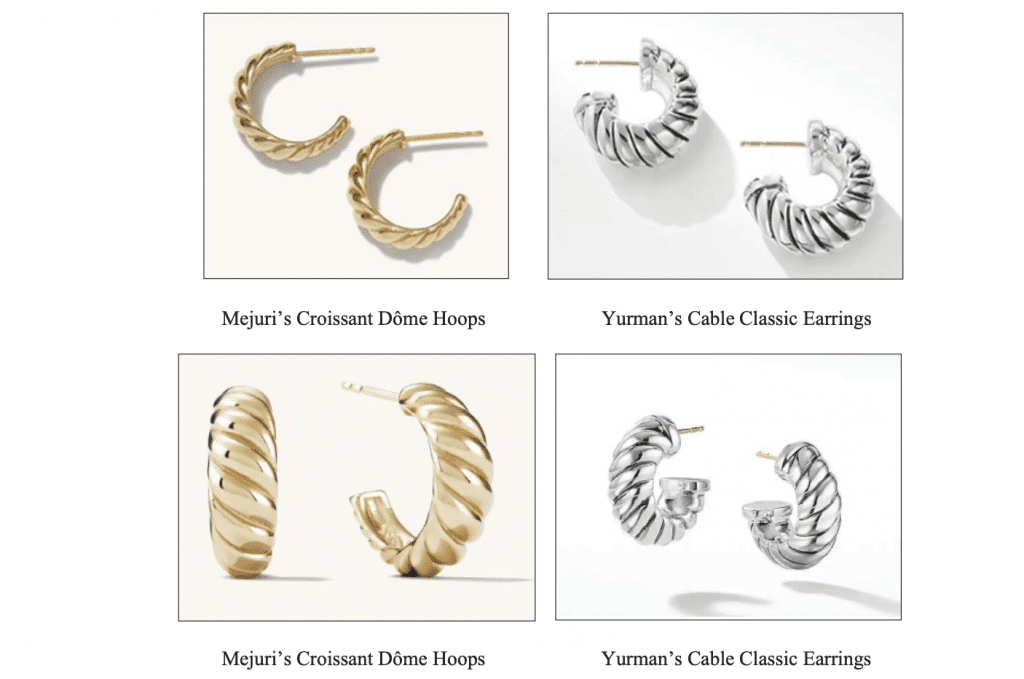Mejuri has responded to the trademark lawsuit filed against it by David Yurman with claims of its own. In a lengthy filing lodged with a New York federal court on Friday, Mejuri argues that in filing a trademark infringement and dilution lawsuit against it, David Yurman is engaging in “an improper attempt to suppress an innovative competitor and to claim ownership of well-known, common motifs – like twist designs – that have been used in jewelry since at least the Roman Empire,” and is seeking declarations from the court that it is not running afoul of David Yurman’s trademark rights because no such rights exist.
In an attempt to chip away at Yurman’s trademark claims, Mejuri primarily argues that David Yurman lacks rights in its Pure Form® Cable Bracelet, Pure Form® Stack Rings, and Cable Classics Earrings, as these product configurations are devoid of the acquired distinctiveness – or secondary meaning – that is necessary for them to function as indicators of source. “Given the commonplace nature” of the designs at issue, Mejuri asserts that Yurman cannot legitimately claim that the design are “unique to Yurman, much less protectable trade dress exclusive to Yurman.”
More than that, Mejuri argues that Yurman also cannot “legitimately claim that consumers associate the appearance of the [jewelry design at issue] with Yurman, as opposed to any other company offering a similar design.” In fact, in making its trademark claims, Mejuri contends that Yurman “ignores the dozens of other jewelry brands – including brands more well-known than Mejuri – that currently offer designs similar to Mejuri’s.” Among the brands that make rings that utilize a similar design as Yurman’s Pure Form® Cable Bracelet, Mejuri points to Tiffany & Co., Cartier, Missoula, Blue Nile, and Macy’s Kay Jewelers, among others. (“Yurman apparently has taken no action against these brands,” according to Mejuri, and instead, “has chosen to target [it] by bringing an anti-competitive attack on a smaller, but rapidly growing, challenger.”)
Still yet, Mejuri asserts that Yurman lacks rights in the designs at issue because they are aesthetically functional. “Granting Yurman the right to exclusively use the features” of its Pure Form® Cable Bracelet, Pure Form® Stack Rings, and Cable Classics Earrings “would put competitors in the jewelry industry at a significant non- reputation related disadvantage,” Mejuri argues.

Taking issue with Yurman’s infringement claims, in particular, Mejuri asserts that while Yurman alleges that there is a likelihood that consumers will be confused between its products and those of Mejuri, the products are “readily distinguishable,” making for a low risk of confusion among consumers. Confusion is also “highly unlikely because of the distinctly different target audiences for the parties’ products,” per Mejuri, which states that it and Yurman “compete in different segments of the jewelry market, and that Mejuri products and Yurman products are never sold in the same stores.”
Given the “little overlap in the purchasers of the parties’ products,” there is “little opportunity for confusion,” Mejuri argues, also arguing that its “consumers are intentional about the design of their jewelry purchases and deliberative in which companies they choose to buy from,” which it claims further reduces the likelihood of confusion.
Looking beyond its lack of confusion – and thus, the lack of infringement – argument, Mejuri asserts that it also has not diluted Yurman’s alleged trademark rights, either by blurring or tarnishment. Primarily, Mejuri claims that its jewelry is unlikely to diminish the distinctiveness of Yurman’s jewelry because Yurman’s pieces are not distinctive to begin with. According to Mejuri, the Yurman jewelry designs at issue are “not inherently distinctive, because the intrinsic nature of the alleged trade dress[es] do not serve to identify Yurman.” The designs also “lack acquired distinctiveness, or secondary meaning,” per Mejuri, “because in the minds of the public, the primary significance of the design is not to identify the source of the [jewelry] as Yurman.”
Still yet, Mejuri contends that “the existence of countless other twist designs confirms the weak (at best) nature of Yurman’s Cable Classics trade dress, thereby defeating Yurman’s claim of dilution [by blurring] against Mejuri.”
As for Yurman’s claims of dilution by tarnishment, Mejuri argues that the jewelry company also fails on this front. While Yurman asserts that Mejuri’s products are “made of an inferior composition,” Mejuri states that it uses “the highest quality materials,” making it so that its jewelry is “not likely to dilute any alleged distinctiveness of [Yurman’s jewelry] by tarnishment.”
With the foregoing in mind, Mejuri argues that Yurman’s complaint is “not a legitimate attempt to protect its intellectual property but is instead an effort to bully and stifle an emerging competitor by claiming a monopoly on classic jewelry designs that have been used for centuries – designs that are ubiquitous in the jewelry industry today.” In response to what it says are “unsubstantiated allegations … that have nothing to do with intellectual property or Yurman’s alleged concerns,” Mejuri is seeking declarations from the court that: (1) Yurman’s alleged trade dress is “not a valid trademark because it lacks secondary meaning, and therefore is not distinctive;” (2) Mejuri has not infringed the alleged trade dress because consumers are not likely to confuse Mejuri’s goods with Yurman’s; and (3) Mejuri’s products “have not, and do not blur” Yurman’s alleged trade dress, and have not and do not tarnish the alleged trade dress.
Mejuri is also seeking an award of its costs and reasonable attorneys’ fees incurred in this action.
Yurman first filed suit against Mejuri in December, arguing that after building one of the “America’s most iconic jewelry brands,” it was looking to crack down on what it says is a pattern of “blatant and willful” copying by younger rival, Mejuri. According to its complaint, Yurman alleges that direct-to-consumer jewelry brand – and “serial copyist” – Mejuri “has chosen to copy” a number of Yurman’s well-known offerings in an effort to “exploit” the Yurman brand and “the goodwill it has built,” and confusing consumers in the process, thereby, serving to infringe Yurman’s well-established trade dress rights and damage its reputation as a purveyor of “exceptional quality” products.
The case is David Yurman Enterprises LLC, et al., v. Mejuri, Inc., et al., 1:21-cv-10821 (SDNY).














